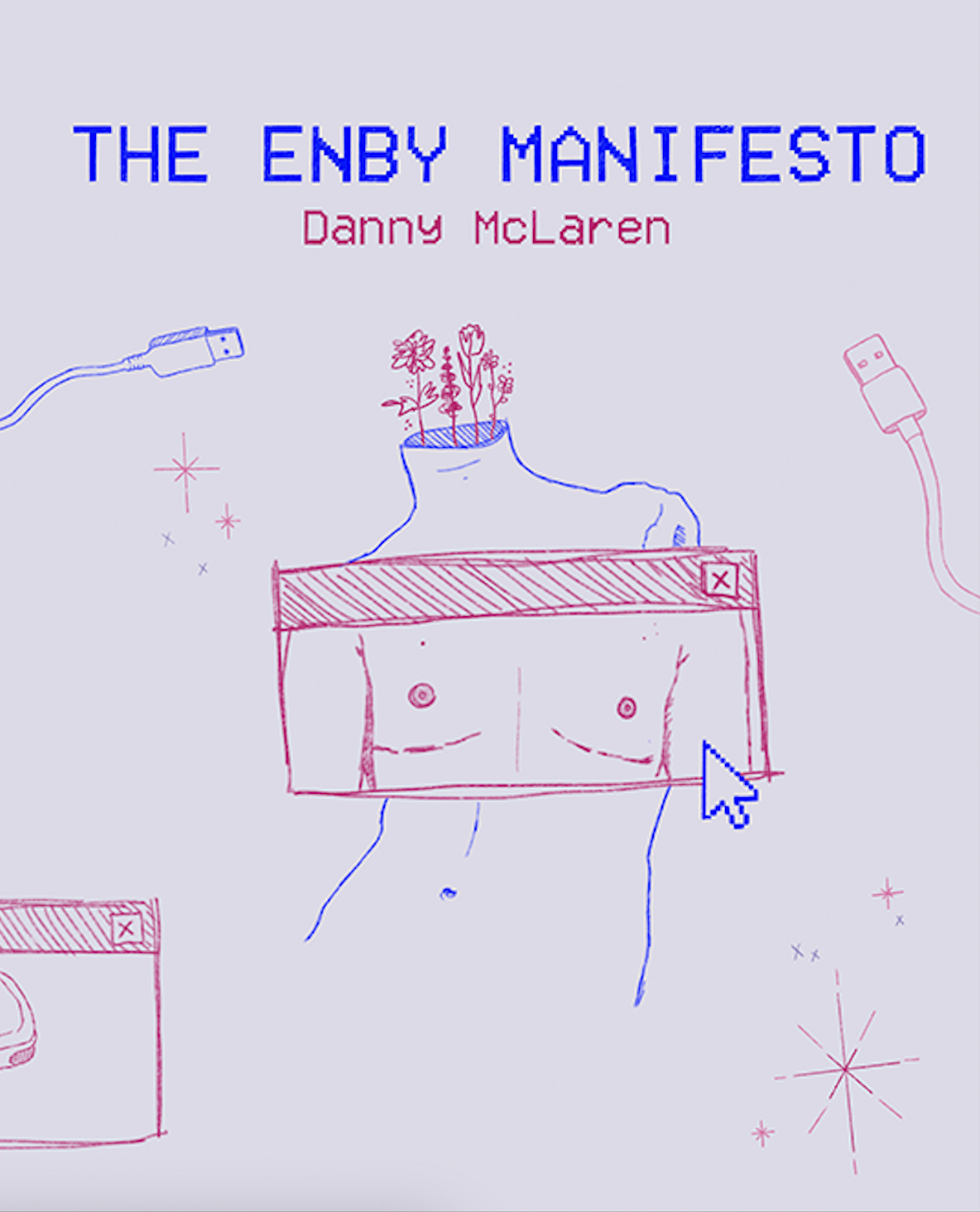Gender is Bullshit: Review of Danny McLaren’s The Enby Manifesto
Danny McLaren, The Enby Manifesto
Porkbelly Press. $9 CAD.
Order a copy from Porkbelly Press.
In Danny McLaren’s opening poem, “I want top surgery,” a title that makes clear what The Enby Manifesto is about, the poet opens with a gorgeous image of two crescent moons:
I want two crescent moons on my chest
loose fitting t shirts and swim trunks and bare flesh.
stitches like kisses,
pink lipstick stains across my skin.
The association of top surgery with moments of vulnerability and intimacy are stitched together with kisses and lipstick, offering a window into the desire to be loved for one’s embodied gender non-conforming difference. The verb “want” asserts the desire for top surgery that transforms scars into two beautiful and inviting crescent moons. The power of McLaren’s wanting draws me in, confronting me with the necessity for a surgery that leads to (otherwise taken for granted) everyday freedoms, including commonplace acts like wearing loose fitting t-shirts and baring skin at the beach or pool, in what I imagine as normative public places. When the stanza takes an intimate turn into the bedroom, top surgery becomes a site of arousal and desire. What a powerful and empowered start to a collection that weaves lyrical poetry with visual and prose poems centered on gender non-conforming joy and pride, resistance and exhaustion.
In “where rage and soft desire touch,” McLaren brings into contact seemingly incompatible feelings in the image and act of touching. “no one but me has touched my body in months,” the poem declares in the opening line, situating us instantly in the isolation and loneliness of the COVID-19 pandemic. Keeping safe by avoiding touch in this context is a matter of life and death, but also a barrier for “the community I’m so desperate for / to survive.”
The poet reverses our usual expectations around touch and touching in the poem. “touch is poison, is disease, is violence/,” laments the impossibility and the need to be touched: “a text can’t fuck me or/ god forbid, touch me in some gentle way.” In a society where digital technologies mediate so much of our everyday lives, from work to play to banking, the pandemic lockdowns exacerbated the extent to which digital technologies mediate our intimate relationships.
In what may be one of the most nostalgic moments of the poem, if not the entire collection, McLaren zooms in on a heartbreaking image, and absence, of loving hands:
relationships end over the phone.
i am not the only one to have lost the hands that
held me so sweetly,
some more permanently than others.
The hands that hold the phone are the same ones the speaker longs for and grieves. The poem grounds itself in the personal and impersonal, in the breakdown of face-to-face intimacy that has been intensified and exacerbated since the pandemic. Knowing there is no substitute for physical touch, the speaker grieves both the loss of a relationship and of old ways of being together before phones took over dating, relationship building, and socializing.
Yet in “Videa Gaymes,” a vibrant prose poem, McLaren gives us another take on digital technologies and their impact on us: “I have a drag persona. her name is Videa Gaymes and she is your titty streamer fantasy. she’s a Vocaloid, cyber robo bitch with a cat ear headset. she’ll fuck you in VR or AR or just plain R.” Virtual and augmented realities become sites of expression, power, and fantasy. The use of language is especially titillating: “titty streamer,” “robo bitch,” and “she’ll fuck you” roll off your tongue in a fast-paced poem where sexual liberation is facilitated and enhanced by the very same technology which acts as a barrier in “where rage and soft desire touch.”
Some of my favorite lines in the chapbook can be found in this gem of a poem: “her head is a webcam, her pussy is a USB port, and her body is a hologram. is she human? Human enough to know that gender is bullshit and bodies should be made of metal.” The energy of these lines transports me to Donna Haraway’s “Cyborg Manifesto,” an essay that rejects rigid binaries that separate human from machine (or human from animal). It echoes Julia Ducourna’s 2021 horror film, Titane, whose cyborg-feminist aesthetics offers us unforgettable scenes of Alexia (a woman part human, part titanium) having sex with a fire engine and giving birth to a baby made with patches of titanium on its body. Is she human, McLaren might ask rhetorically, knowing the category of ‘human’ has been historically policed by cis, hetero, white, and able-bodied males at the detriment of everyone else, those of us who have been treated inhumanely and as less-than-human because of our differences.
“Gender is bullshit,” the speaker of “Videa Gaymes” asserts marching to the most satisfying line of the poem: “Videao Games will short circuit your brain. she easts live wires and transphobes for breakfast.” I read this line as the chapbook’s central thesis, its heart, so to speak, and the most triumphant gesture of taking back GNC and trans power. Beware, Video Gaymes has got her webcam eyes on you.
Sanita Fejzić is a Bosnian-Canadian poet, playwright, novelist, and essayist. Her work has been nominated for and won several literary awards. She has articulated, and is part of, an artistic movement she calls Peasant Futurisms.


